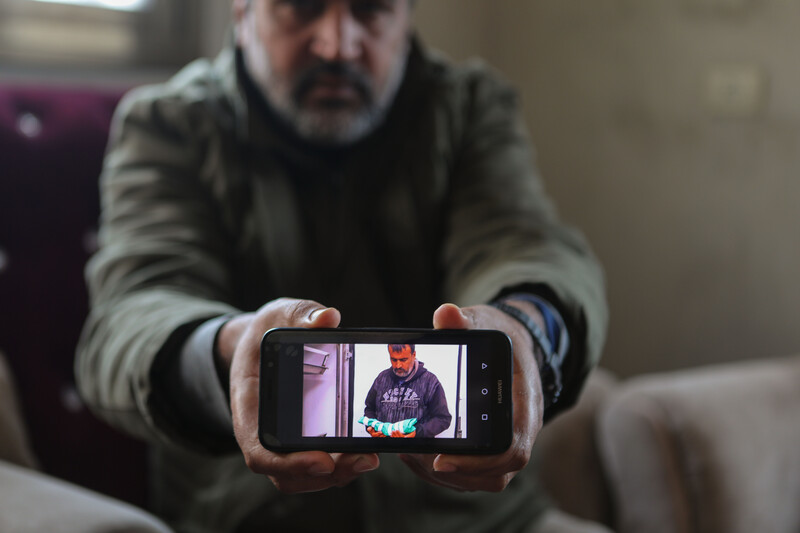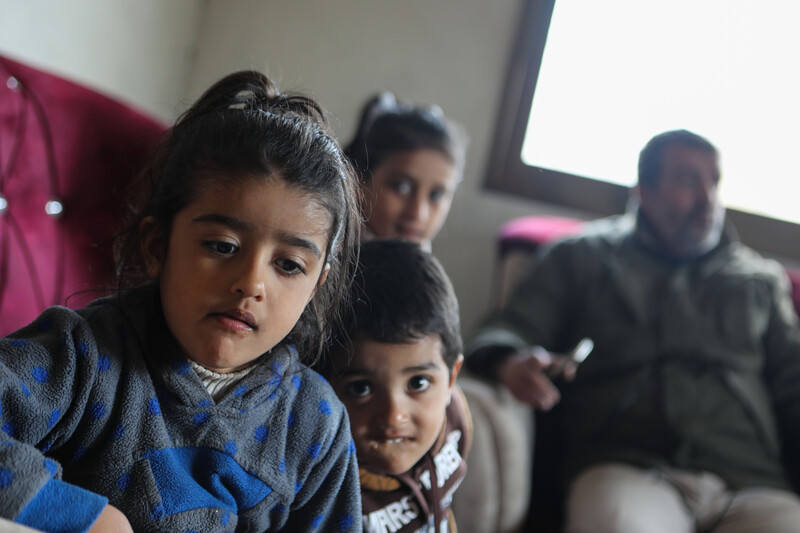Do Israel’s bombs cause miscarriages in Gaza?

Muhammad Abu Tayem shows a photo of him holding Taim’s shrouded body.
Mohammed Al-Hajjar) Amjad Ayman Yaghi - 5 February 2020
Amjad Ayman Yaghi - 5 February 2020
Iman Abu Tayem was six months pregnant when Israel attacked Gaza in November.
She became increasingly frightened on the second day of that attack. The sound of explosions near her home in the town of Bani Suhaila got louder.
One blast in the evening was so powerful that it made her fall to the floor.
Approximately 15 minutes later she lost consciousness. Muhammad, her husband, noticed that she was bleeding and called an ambulance.
She was brought to Abu Yousef al-Najjar hospital in the city of Rafah.
“I woke up in the hospital and my whole body was in pain,” Iman said. “The first question I asked my husband was if my baby was ok. My husband did not answer and I fainted again.”
By that time, Muhammad already knew that Iman had suffered a miscarriage. The hospital staff had told him the bad news about three hours after Iman was admitted during the early hours of 14 November.
Iman had been expecting a boy and the couple were planning to name him Taim. They blame the miscarriage on Israel’s attack.
“The bombing killed my son,” said Muhammad.
The couple have seven other children – five daughters and two sons.
They were looking forward greatly to Taim’s birth; he was going to complete their family. They had decided not to try and conceive any more children once he had arrived.
“I will not have any joy until the Israeli occupation ends,” said Muhammad.
Double loss
Reem Qudaih also had a miscarriage in the early hours of 14 November. She was seven months pregnant.
Reem had awoken at around 3:30 am. As she got out of bed to use the bathroom, she suddenly felt the floors beneath her shaking.
An explosion had taken place near her home in the Khan Younis area of southern Gaza.
Her husband Iyad went to check her and noticed she was bleeding. He called an ambulance.
Reem lost consciousness and was brought to Nasser hospital in Khan Younis. When she woke up, Iyad had to inform her that she had a miscarriage.

Iman Abu Tayem and her husband Muhammad have seven children; they were waiting on the arrival of baby Taim to complete their family.
Mohammed Al-Hajjar
The experience was eerily similar to one almost 11 years earlier.
In late December 2008, Israel mounted an offensive against Gaza codenamed Operation Cast Lead.
Reem was six months pregnant at that time. She went into a state of panic when an explosion took place near her home on 30 December that year. She had a miscarriage on that occasion, too.
Now aged 30, Reem has encountered great difficulty becoming pregnant since then. She and Iyad – who wed in 2006 – had undergone fertility treatment.
After a long time trying to conceive a child, Reem eventually found out that she was pregnant last year. Having a miscarriage in November was “the most difficult thing,” she said.
“I wanted to become a mother and suddenly lost that possibility because of something that was out of my control,” she said. “Now when I see a mother with a child, I wish that I was in her place.”
“Constant stress”
Ayman Odeh, a gynecologist and obstetrician, has spent the past decade working in Gaza’s hospitals. He knows of numerous miscarriages that occurred while Israel was attacking Gaza.
“When a woman is pregnant, it is important that she tries to avoid stress,” he said. “Unfortunately, that is impossible here in Gaza. Pregnant women here live under constant stress. And the stress rises to its highest levels when we are being bombed.”
In the summer of 2014, Israel launched another major offensive against Gaza. It was reported at that time that the maternity ward in al-Shifa, Gaza’s largest hospital for referrals, dealt with a higher than usual number of miscarriages and premature births.
Comparable observations were made during Operation Cast Lead, which took place in December 2008 and January 2009. Data published by the UN Population Fund indicated that maternity wards in Gaza’s hospitals dealt with 31 percent more miscarriage cases at the time of that attack than they normally would have.
Aside from its major offensives, Israel has repeatedly bombed Gaza for shorter periods. In May 2019, for example, Israel conducted a series of airstrikes against Gaza over three consecutive days.
Iman Hamed was five months pregnant when those airstrikes were launched.
On the evening of 5 May, she was alone in her home in the Tel al-Zaatar area of Gaza. She felt intense fear when an explosion occurred nearby. Soon afterwards, she fell down; she had a strong pain in her stomach.
After 10 minutes, she found enough strength to stand up and phone her husband Samir. He rushed home to find his wife screaming.
Soon afterwards, Iman passed out. When she awoke in Gaza’s Indonesian hospital, a doctor informed her that she had suffered a miscarriage.
Iman and Samir had been married for four years but did not have any children. Iman wanted a daughter. After the miscarriage, she learned that she had been pregnant with a girl.
The experience left Iman depressed. She was beginning to recover from the trauma when Israel attacked Gaza in November.
“The bombing [in November] reminded me of my pain,” she said. “I could feel a pain in my stomach again.”
“No escape”
Back in September 2005, following the unilateral withdrawal of settlers from Gaza, Israel began using sonic booms during its air raids on the territory. The Gaza Community Mental Health Programme stated then that the rate of miscarriages rose when these weapons – which break the sound barrier at low altitude – were used at regular intervals.
Maryam Khalafullah was three months pregnant when she heard an extremely loud explosion in September 2005. Trembling and bleeding, she was brought to hospital, where she was told that she had miscarried.
“My son would have been 15 this year,” she said. “I suffered depression for a whole year after my miscarriage.”
Abdul Karim al-Farra worked as a gynecologist and obstetrician in Gaza between 1975 and his retirement in 2006. In his view, Israel’s violence has long increased the risk of miscarriage among Palestinian women.
He noticed, for example, that many pregnant women had miscarriages after they were exposed to tear gas fired by Israel during the first intifada.
“There was no escape from tear gas,” he said. “It was fired at crowds and at houses and in the alleys between them in refugee camps.”
As well as causing psychological harm, a miscarriage can have long term repercussions on a woman’s fertility.
“Women who have suffered a miscarriage often find it difficult to get pregnant again,” said al-Farra. “And if they do get pregnant again, they may face difficulties with the pregnancy.”
